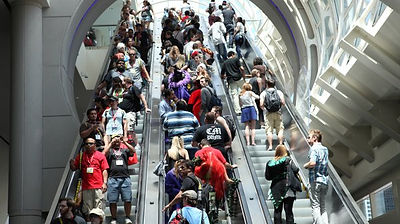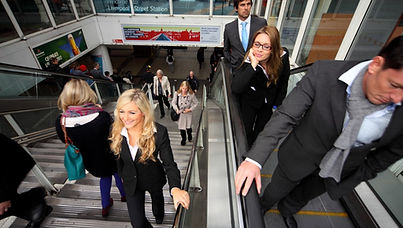Changing People's Lives
-
Escalators help to facilitate movement between places for the elderly or for people who have problems walking and climbing stairs.
-
Escalators can also able to be used in navigation. Shapes of escalators can be customised to direct people to certain parts of buildings that are less conspicious. Such escalators are normally used in museums.
-
As modern escalators come with management systems that allow for ajustable speeds, escalators offer an advantage to building managers in crowd management. Escalators can be made to run slowly, so that passengers don't arrive in the same area, during peak hours.

Reduced Gang Violence
-
Gang violence in Colombia, Comuna 13 has definitely been reduced since the escalators were introduced.
-
The area around the escalators are much more open than it used to be, with walkways and public spaces. There are fewer dark alleys for criminals to work in.
-
A surveillance team is hired to take charge of running and maintaining the escalators from the neighbourhood, which may have contributed to the drop in suspicious activity.

Picture of the escalators in Medellín's Comuna 13.
Positive Impact
Outdoor escalators in Medellin, Colombia's Comuna 13 shows how it changes the lives of people living there.
SOCIAL IMPACT - The Positives and The Negatives
Negative Impact
Not Following Societal Norms
-
Some people may not follow societal norms in the use of escalators and will cause problems for others. People who do not keep to one side of the escalator when commuter volume is high will end up blocking the way of people who are rushing to reach their destination.
To further understand the impact of not following societal norms, here is a game you can play!

Health Problems
-
According to a study published in the Journal of the American Medical Association, taking the escalator, as opposed to taking the stairs, increases the risk of heart disease.
-
Research by the Universiy of Copenhagen showed that after just 2 weeks of reduced stair-climbing, unhealthy side effects of this reduction could be noticed.

Injuries
-
In the United States, there are about 10,000 escalator-related injuries per year that require emergency department treatment. A steady incease in these injuries have been reported since the 1990s.
-
More than 50% of all escalator-related injuries happen at public transportation facilities and around 33% of them happen at shopping malls.

Fatal accidents

-
There have been cases of fatal escalator accidents in the world, People who do not use the escalator properly (Eg. running or playing on the escalator) run the risk of getting involved in very serious escalator accidents.
-
Some fatal accidents involve people who get their clothes or other belongings caught in the escalator. A woman in Canada was killed after the scarf she was wearing got caught and wrapped around her neck, in a metro station in Montreal.



One incident that led to increased regulations and rules:
Betsy Vo and her family were riding an escalator at a Bellevue department store when the steps suddenly began to collapse beneath their feet. Seven others, including Vo's husband and youngest son, were injured as the escalator fell apart at the Bellevue Square Macy's in December 2012.
An investigation by the state Department of Labor and Industries (L&I) found that the company (Schindler Elevator Corp) hired to maintain the escalator, failed to conduct safety tests and other routine maintenance that could have prevented the accident.
Government Response:
The failure of the Macy's escalator alarmed state officials who regulate escalators and elevators in Washington. Soon afterward, they established new rules governing elevator and escalator maintenance companies. They also began issuing new fines for escalator and elevator owners who don't promptly address problems found by state inspectors.
Thus the Bellevue accident accelerated the state's efforts to beef up its regulations for elevator and escalator maintenance companies.
Initiatives to Reduce Negative Impacts
-
Increased safety regulations to combat escalator accidents
-
Fighting the problem of obesity



Tackling Obesity
A national health campaign targeting 100 'small step' lifestyle changes to combat obesity was introduced by the government in the US.
It advocates people to use stairs instead of the escalator in public settings. Motivational signs have been used to prompt people to use the stairs over the escalator. Studies were done during the campaign and the results were reviewed. The average study included approximately 45,000 observations that were recorded across an average of 15 weeks.
Results have shown that motivational signs have encouraged people to climb the stairs more often as compared to taking the escalator. It has also helped to reduce obesity. This campaign can go hand-in-hand with other efforts to reduce the problem of obesity.